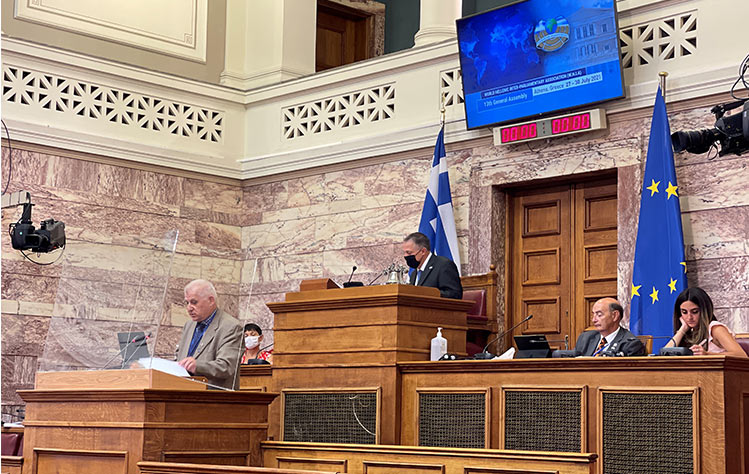Around Webster: Curtis on info-warfare; Nomikos at Greek parliament; Glaveanu research grant
August 27, 2021
Recent professional news and achievements among Webster University faculty members include:
Curtis Triad of Disruption Theory in National Defense
Jim Curtis' theory on how to combat information warfare was published in a two-page spread in National Defense magazine's August edition.
 Curtis' "Triad of Disruption" theory explains how nation-states and terrorist groups
are using the combination of social media, digital social engineering, and propaganda/fake
news to attack the United States in order to sow discord and weaken the nation's standing.
Curtis' "Triad of Disruption" theory explains how nation-states and terrorist groups
are using the combination of social media, digital social engineering, and propaganda/fake
news to attack the United States in order to sow discord and weaken the nation's standing.
"I developed the theory in 2018 and have been teaching it in class and speaking about it at forums since then," Curtis says. "It has now been published in one of the largest national defense periodicals in the nation, and I am receiving inquiries and invitations to further discuss the theory by segments of the Department of Defense."
In the article, which appears on pp. 18-19, Curtis writes: “The elements of the Triad of Disruption merge to form an extraordinarily powerful weapon providing nation-states and terrorist groups with the capability to execute information warfare against a target on a massive scale, at low risk or cost. The Russian attack against the United States’ 2016 presidential election was the most effective attack using the triad in history, but it won’t be for long.”
Nomikos Speaks in Greek Parliament
 John M. Nomikos of Webster University's Athens campus spoke in the Greek Parliament on "Eastern Mediterranean
and Transatlantic Relations: A Greek Perspective." The occasion was the 13th World Hellenic Inter-Parliamentary Association (WHIA) on July 29, 2021.
John M. Nomikos of Webster University's Athens campus spoke in the Greek Parliament on "Eastern Mediterranean
and Transatlantic Relations: A Greek Perspective." The occasion was the 13th World Hellenic Inter-Parliamentary Association (WHIA) on July 29, 2021.
Nomikos is an associate professor based at the Webster Athens campus and director at the Research Institute for European and American Studies (RIEAS).
Glaveanu Receives Grant for Diversity, Creativity and Innovation Project
 Vlad Glaveanu, head of the Department of Psychology and Counselling at Webster University Geneva
and director of the Webster Center for Creativity and Innovation (WCCI), is co-investigator,
with Pia Stalder, in a research project that was recently awarded 99,950 CHF by the
Economy and Management scientific committee of HES-SO (the University of Applied Sciences
and Arts of Western Switzerland).
Vlad Glaveanu, head of the Department of Psychology and Counselling at Webster University Geneva
and director of the Webster Center for Creativity and Innovation (WCCI), is co-investigator,
with Pia Stalder, in a research project that was recently awarded 99,950 CHF by the
Economy and Management scientific committee of HES-SO (the University of Applied Sciences
and Arts of Western Switzerland).
The project, titled "DIVERSITYCreaTool," aims to develop a short diversity training that can increase the potential for creativity and innovation in organisations. It will do so by building on Stalder’s previous work on games that enhance creativity (the InnoGame) and Glaveanu’s expertise on diversity and perspective-taking.
The research uses experimental and qualitative methods to develop and test the new tool and it will take place over a year and a half. The ambition is to use this study in order to apply for further funding for creating a Serious Game that could help organisations use diversity as a creativity asset and as the engine of their innovation processes.

